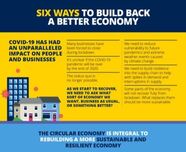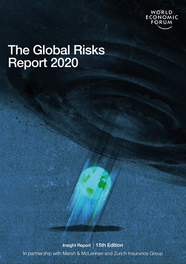|
Made with input from SPL, Zero Waste Scotland has launched an animation on #CircularProcurement. Highlighting climate emergency challenges and issues around linear procurement, the video shows how embedding circularity benefits buyers, suppliers communities and the environment:
 WRAP has released advice on building a stronger economy post COVID, harnessing the circular economy, which has the potential to create up to half a million new jobs. Read more here. Living within the means of the Earth's resources is a global concern, leading to a focus on the circular economy, reducing the reliance on virgin raw materials. A study by the European Commission quantifies the amount of material that is not being recycled but could be — known as the ‘Circularity Gap’.
Read more here. A global economic value of US$6 trillion (£5 trillion) has been attributed to the mental health benefits of the natural environment, adding to the value arising from ecosystem services and tourism. Poor psychological health has an enormous economic cost, and positive mental health contributes to a stronger economy.
Protected natural areas are under increasing pressure from political and economic factors, and climate change. An Australian study has calculated the economic value of natural areas in terms of mental health. Read more: https://ec.europa.eu/newsroom/dae/document.cfm?action=display&doc_id=68053 https://www.nature.com/articles/s41467-019-12631-6 Science for Environment Policy have produced a study focused on the impacts of the current car-centred urban lifestyle on public and environmental health. The study follows a Barcelona planning strategy, which shifts from being a car-centred model to people-centred city design. Restructuring this model to reduce motorised transport and reclaiming space for people, has many positive effects including improving air quality, promoting active lifestyles and improving public health.
From our own recent experiences of the UK COVID-19 lockdown, we have seen that the reduction in all forms of traffic had a significant improvement air quality, and the motivation to get out to exercise and enjoy the environment resulted in a running and cycling boom. Most of us can work effectively from home, mostly we do not need to travel great distances to attend meetings. This model can and should work. Read more about the study here. Packaging is a major constituent of almost all products, services and projects procured. In order to design out waste, and eliminate confusion over which packaging is reusable, recyclable or not, DS Smith (sustainable packaging leader) has conducted research which highlights the desperate need for clarity in the end of life treatment of packaging, and a result has launched new Circular Design Principles.
The Principles have been created to support companies with the innovative design of packaging to support reuse and recyclability, designing out waste and pollution, and provide clear labelling to keep recyclable material out of the general waste. Read more from Circular Online here. The COVID-19 global health crisis has highlighted the role of and problems with procurement of desperately required resources. NHS and other procurement professionals are working tirelessly to fill gaps.
Thoughts inevitably concentrate on the short term problems this pandemic brings; those suffering, their families and the amazing work of healthcare workers and other key workers. SPL has long established relationships with many NHS Trusts, Boards and suppliers and will continue to support them in many ways. At the same time there is much debate regarding the need to learn from this – humanity does not have a good track record of learning from past mistakes but is extremely resourceful and the clamour for a more sustainable future is gathering pace. We should always focus on outcomes. For example, ask yourself:
Perhaps now is the time to reset relationships between procurement and commissioning, internal stakeholders, suppliers and intended users? We are seeing every day the benefits of collaboration, cooperation and what can be achieved in a very short time if the will is there. Part of this supports the transition to a circular economy – not some nebulous concept but, from a procurement and supply perspective, a driver that can unlock many of the above outcomes and benefits. A recent article worth reading: Circle Economy. 5 years since the Modern Slavery Act (MSA) 2015, The UK Government’s Modern Slavery Statement was published on 26th March.
The MSA requires large businesses to report annually on their systems to prevent modern slavery in their operations and global supply chains. The UK Government's Statement assesses the risk of modern slavery, and details how they are working to eradicate modern slavery from their supply chains. This now paves the way for statements to be published from the rest of the public sector. Read the full statement here.  Last week's new budget confirmed a plastic packaging tax of £200 per tonne, for manufacturers and importers of packaging made from less than 30% recycled plastic. The consequence should result in the use of recycled plastics in packaging increasing, reducing waste and carbon emissions. The rate and threshold level will be continually under review to ensure ongoing improvements. |
Archives
July 2024
Categories |
- Home
- About
-
Our Work
- Scottish Government
- Driving emissions reduction in supply chains
- Buying Social Justice - equality in procurement
- World Bank - Africa and Caribbean Sustainable Public Procurement
- America - OAS and IDB
- Jamaica - public procurement
- India - sustainable procurement training
- SPL in Africa
- ITAIPU Binacional and Latin America
- City of Greater Geelong
- Marrakech Task Force
- Health and Social Care
- Greater London Authority
- Innovation in procurement
- Circular Economy
- Plastic Waste Reduction in Canada
- SPL Blog
- Contact
Site powered by Weebly. Managed by netnerd.com
Photos from Eric Kilby, andreboeni


 RSS Feed
RSS Feed
